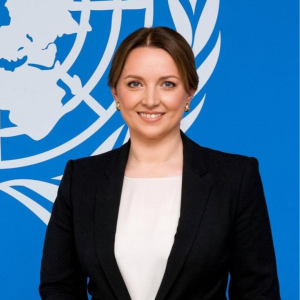Trinidad and Tobago and UN Take 'Halftime Huddle' on SDG Progress
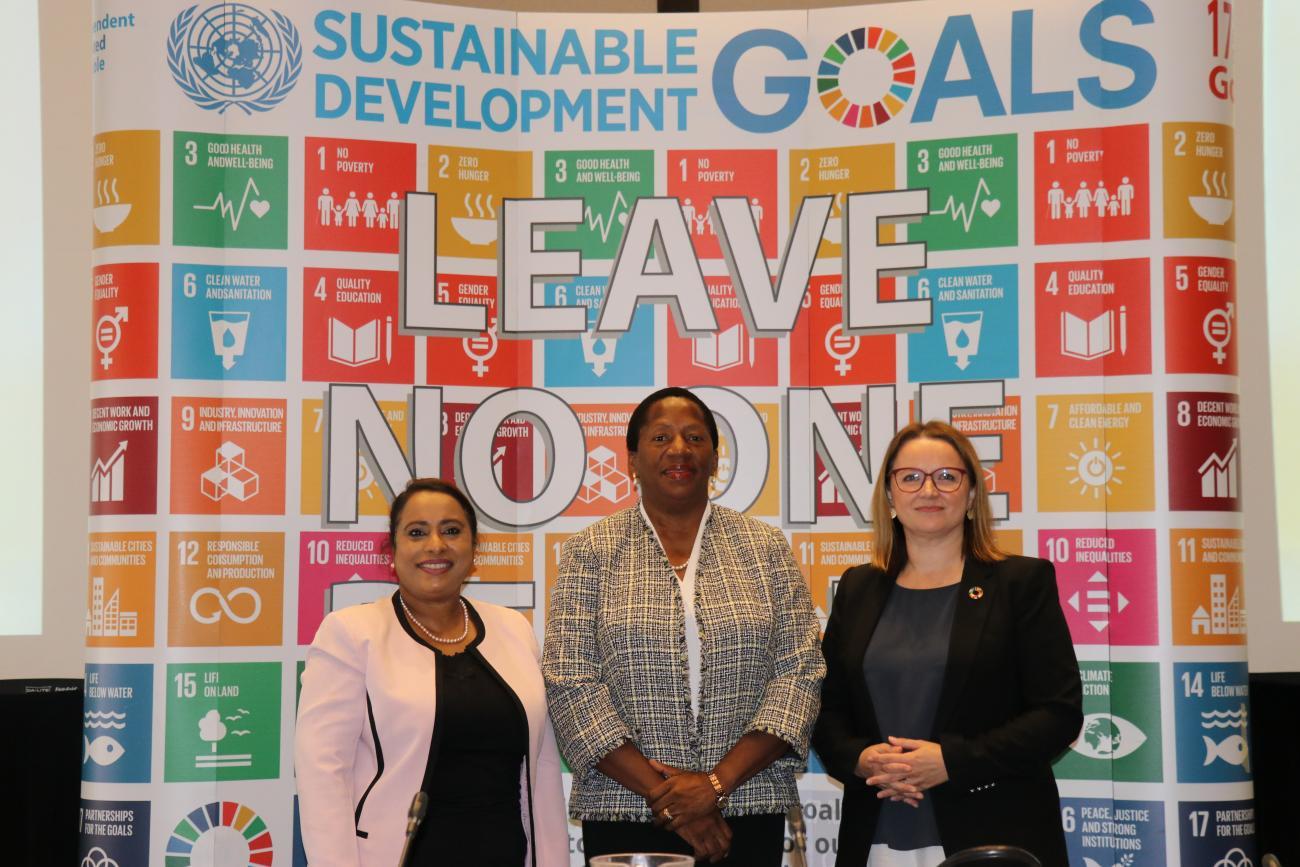
𝐓𝐫𝐢𝐧𝐢𝐝𝐚𝐝 𝐚𝐧𝐝 𝐓𝐨𝐛𝐚𝐠𝐨 𝐛𝐮𝐢𝐥𝐝𝐬 𝐜𝐨𝐧𝐬𝐞𝐧𝐬𝐮𝐬 𝐨𝐧 𝐢𝐭𝐬 𝐩𝐫𝐢𝐨𝐫𝐢𝐭𝐢𝐞𝐬 𝐟𝐨𝐫 𝐒𝐃𝐆 𝐚𝐜𝐜𝐞𝐥𝐞𝐫𝐚𝐭𝐢𝐨𝐧.
The Sustainable Development Goals (SDGs) are in peril. At the mid-point in the journey to the 2030 deadline, only 12% of SDG targets are on track. On September 18, the UN Secretary-General will convene the SDG Summit in New York to sound a clarion call for financial stimulus and concerted action. Leading up to this event, Trinidad and Tobago hosted an SDG Roundtable consultation on Monday, September 11 in Port of Spain. The mission: to pinpoint SDG priorities that need accelerated momentum to be on track by 2030. UN Resident Coordinator, Joanna Kazana, details the ‘halftime huddle’ conversation and what it means for Trinidad and Tobago’s next steps.
“For a country or economy of any size, achieving the SDG agenda is ambitious.
For Small Island Developing States, the task can be a staggering proposition.
A total of 17 SDGs, 169 targets and 247 indicators must be met by 2030.
For Trinidad and Tobago, there is an added layer of complexity: its high per capita income makes the country ineligible for Official Development Assistance (ODA) finance, despite the many structural vulnerabilities facing Caribbean nations- exacerbated by climate change, global shocks and the illegal trade of weapons and drugs.
When it comes to SDG financing and the potential for new investments, Trinidad and Tobago has to rely largely on its own budgetary resources. The UN, bilateral donors and international financial institutions provide grants for important work, but these projects are limited in scale and duration.
That means the monumental strides required to achieve sustainable development demand greater domestic resource mobilisation, defunding inefficiencies, innovative thinking and unconventional partnerships. The SDGs are both the shared vision and the practical reference framework to guide this journey.
Yet with just six years left, achieving the SDGs may seem daunting.
But it is not impossible, and Trinidad and Tobago is proof of the inexorable spirit required to cross the finish line.
But it is not impossible, and Trinidad and Tobago is proof of the inexorable spirit required to cross the finish line.
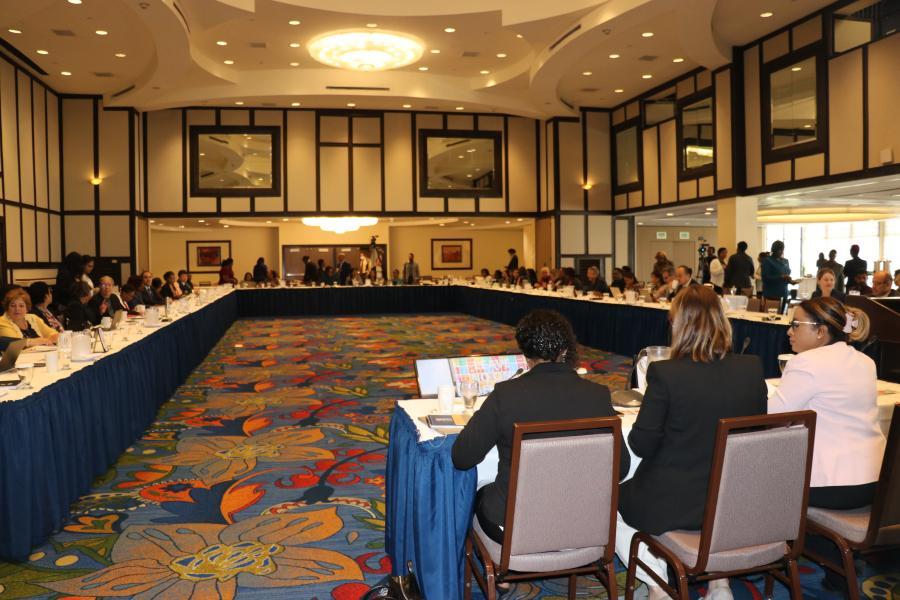
Reviewing the ‘State of Play’
The pride, patriotism and perseverance that are hallmarks of the 1.3 million people who call these islands home seep seamlessly into the discussions at the Hilton on this Monday morning. More than 100 voices from the public and private sectors, civil society, international financial institutions, community-based organisations and the global development community are seated around a table that fills the hotel’s ballroom. They’re dissecting the country’s state of play on the SDGs.
The Ministry of Planning and Development has convened this SDG Roundtable dialogue, with the support of the UN system I have the privilege to lead. This support falls under our inter-agency Joint SDG Fund project to modernise the country's data and statistics.
The session begins with a snapshot of the country’s SDG progress using data from UN Stats.
The data show that Trinidad and Tobago has made significant progress on some of the SDGs, while others require review and acceleration. A deeper dive reveals that progress on a number of SDG targets has slowed or stagnated. While important work is happening in these areas, a jumpstart is needed to rejuvenate momentum.
As they chew on the data, participants in the room begin tackling what feel like existential questions about the country’s future.
What does ‘getting it right’ by 2030 look like?
What strategic commitments should we make to accelerate SDG progress?
What are the top three or five SDGs where progress could act as a stimulus, like a rising tide lifting all 17 Goals?
What is the story that Trinbagonians want to tell their children -and the world- about the heroic efforts and choices being made now to build a better future for Trinidad and Tobago?
The chorus of answers from the audience is unanimous on a few key themes.
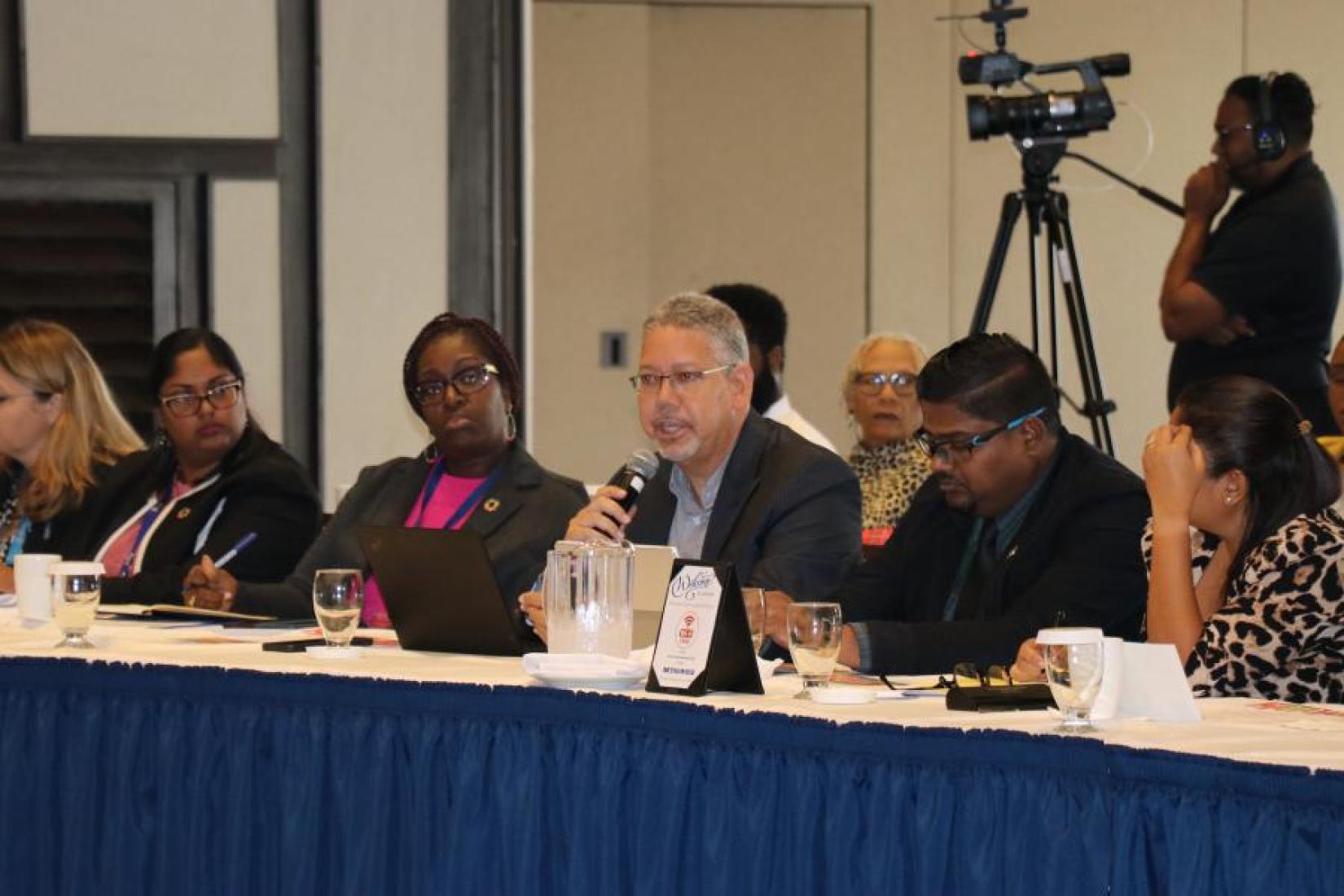
Better Data and National Statistics
Regardless of which perch they sit on, all stakeholders agree the country needs more robust tools to make data-driven decisions.
As Minister of Planning and Development, Pennelope Beckles, succinctly states it in her remarks, ‘What does not get measured, does not get done.’
Without more timely data being produced and collated, it is difficult to track the SDGs. That means it’s also challenging to know where to target stimulus funding. This is why the UN Country Team project under the Joint SDG Fund is working with the country's Central Statistical Office to beef up human and technological capacity and producing recommendations for a framework the country can use to establish a Centre of Excellence for Big Data.
Public officers at the Roundtable point out the natural addendum to needing more data: developing stronger monitoring and evaluation capacity.
The human resources, skill set and strategic direction required to collect, streamline and analyse data may be uneven across the public sector. Digitisation of government services would bring immediate benefits in this area. The private sector also has a role it can play in sharing relevant data to improve the country’s data ecosystem and monitoring capacity.
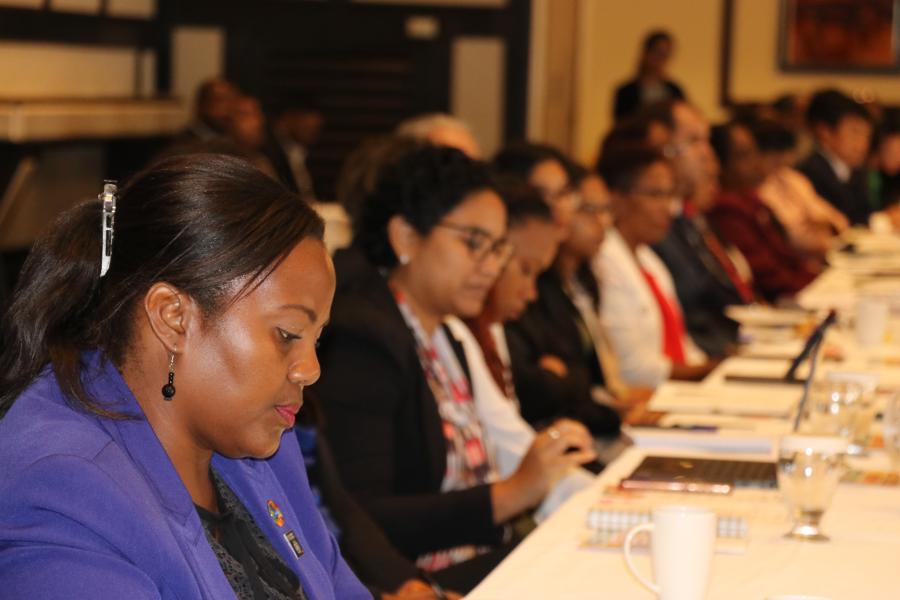
Poverty Reduction
The issue of poverty comes up time and again during the three-hour discussion. A private sector leader links poverty to poor education outcomes and increased risk of delinquency. A health professional mentions the interplay between poverty and inequality. A public officer speaks about the need to measure poverty through a multi-dimensional lens. Deprivation, health outcomes and housing are all factors to measure alongside household income.
Without tackling poverty, progress on other SDGs – including Peace, Justice and Strong Institutions (SDG 16) and Reduced Inequalities (SDG 10) - will be challenging. This issue emerges as a key priority for everyone in the room.
Quality Education
When education begins dominating the Roundtable discussion, you really see the synthesis between the 17 Goals. You also appreciate how multi-faceted a singular SDG can be.
One participant points out the limited capacity of the education system to accommodate Persons with Disabilities. Another cites challenges facing university graduates, who struggle to find jobs that match their area of study. She says the resultant brain drain diminishes the local talent pool.
A private sector representative advocates for the education system to produce job creators instead of job seekers. Yet another contributor calls for a restructured curriculum to prepare students for the labour market disruptions that have already begun as Artificial Intelligence takes root.
Why do girls perform better at school? How does childhood well-being and youth vary between boys and girls? Questions that cut to the heart of the way we teach and learn.
With education outcomes linked to Decent Work and Economic Growth (SDG 8), Gender Equality (SDG 5) and Reduced Inequalities (SDG 10), there is unison among participants that targeting this area can yield ripple effects across the SDG agenda.
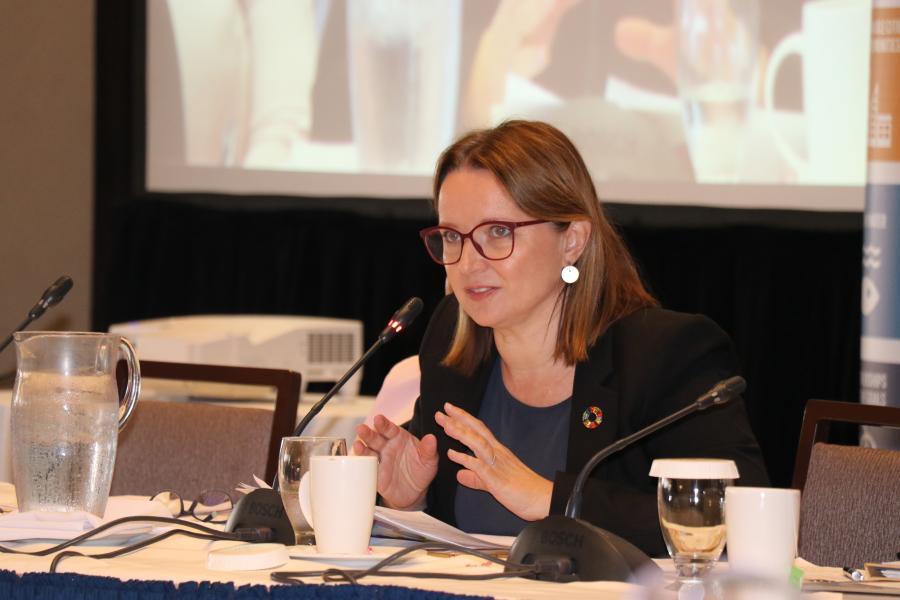
Peace and Security
From the business leader to the civil society advocate – violence recurs throughout the discussion as an imperative focus. Whether they’re talking about the young men who slide into delinquency or the costs of insecurity on a company’s bottom line, every sector in the room identifies a different impact of crime on society.
Billions of dollars are already spent annually on crime response and prevention by the Ministry of National Security and other state-run social protection programmes. Progress in achieving other SDGs linked to inequality, access to education and poverty could produce significant benefits in reducing violence. That would save the country money it could invest into developing its human capital.
In my remarks, I argue that human security is a ‘public good’. Like water in your taps, electricity, communication and transport infrastructure, security can be delivered and nurtured by everyone – the State and the people alike – to make this country a paradise for people and for business.
A New End-Game Strategy
By the end of the three hours, the Ministry of Planning has diverse, rich inputs to shape the country’s contribution to the SDG Summit. Trinidad and Tobago, like all UN Member States, has been asked to declare three clear, targeted actions it will take to rescue the SDGs. This declaration will feature centre stage, as Trinidad and Tobago now holds the presidency of the UN General Assembly. But the benefits of the national Roundtable will last long after the SDG Summit in New York ends. It brought together a network of willing development partners who found common ground. It offered direction for the Government’s halftime strategy review on a revitalised plan of action for the SDGs over the next six years. And it reinforced the commitment to achieving equitable progress and prosperity - with a resounding win in the second half.”
Written by
